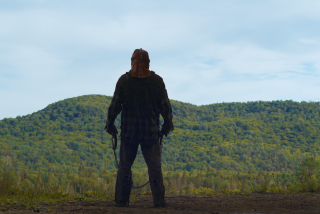Brit Crackdown on ‘Video Nasties’ : Regulations Try to Curb Films Deemed Harmful to Kids
LONDON — A new film from the producers of the award-winning “Leon the Pig Farmer” appears to be the first casualty of the British government’s move to impose tougher censorship regulations on the nation’s $1.75-billion video industry, the world’s second-largest after the U.S.
“Beyond Bedlam,” described by its makers as a “tongue-in-cheek, action-horror film” has been denied video certification, meaning it cannot be released on video in the U.K.
“The implications for the industry are horrendous,” says “Bedlam” producer Paul Brooks. “It’s just insane.”
Reluctantly bending to public and political pressures, the government recently announced it will crack down on so-called “video nasties”--videos containing violence or other images that could be harmful to children. But vague wording of the proposed regulations have thrown the video industry into confusion.
Meanwhile, a number of films, including the critically acclaimed “Reservoir Dogs,” are waiting in limbo while officials decide whether they are suitable for video release.
The new regulations are considered unnecessary by many in Britain, which already has the strictest film and video censorship laws in the Western world. And videos undergo tougher censorship than films in the U.K. because they are considered more likely to be seen by children. A number of movies--including “The Exorcist”--have never been certified for video release in Britain.
But despite their own public pronouncements that the existing regulations are strong enough, government officials are making them tougher anyway as an apparent matter of political expediency.
“Video nasties,” as the British call them, have remained a hot-button issue since last November’s trial of two 11-year-old boys who kidnaped and murdered toddler James Bulger. At the end of the trial, the presiding judge wondered aloud whether watching violent videos may have prompted the boys’ actions.
Although police and prosecutors stated that violent videos played no role in the case, the judge’s comments unleashed a torrent of stories in the tabloid press calling for stronger laws against violent and sexually explicit tapes.
Liberal Democrat MP David Alton then proposed an amendment to a criminal justice bill, currently wending its way through Parliament, that sought to ban the sale or rental of all videos that “present an inappropriate model for children or are likely to cause psychological harm to children.”
In other words, every film, no matter what its rating or intended audience, would have to be suitable for children to obtain certification for video release.
“We were absolutely appalled,” says Lavinia Carey, director general of the British Video Assn., which represents distributors and rights-holders in the U.K., including the Hollywood studios. “It was a ludicrous piece of legislation. It would effectively mean the whole video industry would be destroyed.”
About 70% of the videos rented in Britain are rated “15” (meaning they should not be shown to anyone under age 15) or “18” (not for view to those under 18) and most, if not all of them, would be banned under Alton’s proposal, she said. The rest of the videos rented in Britain are rated for view by all age groups.
Even the head of the British Board of Film Classification--the censorship office--complained that the measure would outlaw award-winning films such as “Schindler’s List” and “Dances With Wolves.”
*
The Conservative government opposed the idea, calling it unworkable and unenforceable. But when 80 Conservative MPs said they would support Alton’s amendment, government ministers quickly came back with their own proposal.
“The government was going to be defeated, so they panicked and reached a compromise,” says Carey.
Under the government’s plan, retailers renting or selling videos rated “18” to minors will face up to six months in jail, while those renting or selling videos that have not been given any classification--and are therefore illegal--will face up to two years imprisonment.
That seems clear enough. But what is causing confusion are the proposed new guidelines under which the censorship board is to classify and certify videos.
“What we’re telling the BBFC,” says a spokesman at the government Home Office, which handles domestic affairs, “is to consider the psychological effect of videos on children.”
Exactly what that means and how it will be interpreted is not clear.
James Ferman, chairman of the British Board of Film Classification, did not return calls from The Times seeking comment.
Says Carey of the British Video Assn., “We feel we’ll survive this with no noticeable effect on the industry.” But she predicts that more films will have to undergo censorships cuts, more will be given a higher rating classification than they would have previously and that a greater number of films will be denied video certification.
Although the government’s proposal is part of a larger criminal justice bill that is still under consideration in Parliament, and therefore has not gone into effect, the film censorship board may already be applying the new regulations preemptively.
At least that’s the feeling of “Beyond Bedlam” producer Brooks. He said he originally was told by the BBFC that his film was being granted certification. But after a tabloid newspaper ran an article citing three graphic scenes in his film--which has just been released in British theaters--the BBFC announced it was denying it a video certificate.
The scenes cited by the tabloid involved a dream sequence of a young man making love with an elderly woman, a syringe injected into an open wound and a big fight at the end of the movie.
Brooks says the film is a parody of American horror films and features “comic-strip violence--Tom and Jerry violence. The film is nowhere near a video nasty. It’s a joke.
“The fact that we were passed uncut previously does suggest political and tabloid hysteria. It’s repressive censorship if it continues.”
More to Read
The biggest entertainment stories
Get our big stories about Hollywood, film, television, music, arts, culture and more right in your inbox as soon as they publish.
You may occasionally receive promotional content from the Los Angeles Times.










